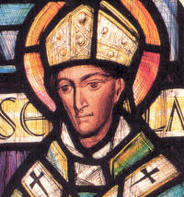 Saint Anselm is a towering figure in monastic, theological and philosophical circles whose works take diligence in getting your mind around. Even centuries later he speaks with precision. Saint Anselm of Canterbury (c. 1033-1109) an Italian by birth, Anselm held various academic and ecclesial titles; he was the archbishop of Canterbury from 1093 until his death in 1109. The Church tells us he is the father of scholasticism and famous for the ontological argument for God's existence. Though never formally canonized --the process was not developed then-- Anselm was acknowledged a saint by Clement XI and named a Doctor of the Church (1 of 33). One point I noticed recently about Saint Anselm and the promotion of truth is this...
Saint Anselm is a towering figure in monastic, theological and philosophical circles whose works take diligence in getting your mind around. Even centuries later he speaks with precision. Saint Anselm of Canterbury (c. 1033-1109) an Italian by birth, Anselm held various academic and ecclesial titles; he was the archbishop of Canterbury from 1093 until his death in 1109. The Church tells us he is the father of scholasticism and famous for the ontological argument for God's existence. Though never formally canonized --the process was not developed then-- Anselm was acknowledged a saint by Clement XI and named a Doctor of the Church (1 of 33). One point I noticed recently about Saint Anselm and the promotion of truth is this......when each single creature keeps, either by nature or by reason, its proper place [in the order of things] --it is said to obey God and to honor him. ... When a rational nature wills what it ought to, it honors God --not because it confers anything on Him but because it willingly submits itself to His will and governance. And, as best it can, it stays in its proper place in the universe and preserves the beauty of the universe.
-Cur Deus Homo, 1:15
So what Saint Anselm is saying, the premise from which order and beauty is deduced is Saint Benedict's intention that the monk [and today, all Christians] seek the glory of God in all things. For Anselm and therefore us, beauty in keeping the proper order of things is obediential in front of God; that is, it is about keeping a fitting sense of friendship with the Trinitarian God. On this feast of Saint Anselm, let us prefer nothing to Christ seeking God's glory above all.
You may be interested in reading Pope Saint Pius X's encyclical for the 800th anniversary of Saint Anselm's birth, Communium rerum (1909).

